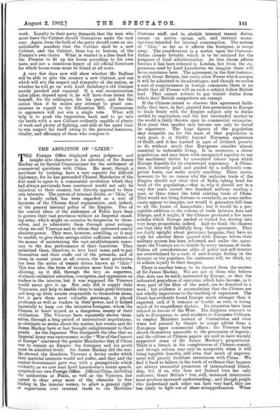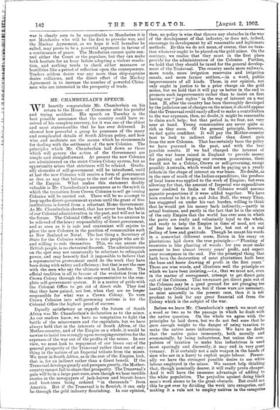THE ABOLITION OF "LISIN."
THE Foreign Office displayed great judgment and insight into character in its selection of Sir James Mackay as its Special Commissioner for the settlement of commercial questions with China. He must, though a merchant by training, have a rare capacity for difficult diplomacy, for he has persuaded Chinese Mandarins of the first rank to agree to a, commercial revolution which they had always previously been convinced would not only be injurious to their country, but directly opposed to their own interests. The system of internal duties, or "likin," as it is locally called, has been regarded as a sort of keystone of the Chinese fiscal organisation, and, indeed, of the general internal policy of the Empire. Two of the central ideas of the statesmen of Pekin have been to govern their vast provinces without an Imperial stand- ing army, which might on occasion be dangerous to them- selves, and to administer them through great satraps, whom we call Viceroys and to whom they entrusted nearly absolute power. They were, however, unwilling, or it may be unable, to give these satraps either sufficient salaries or the means of maintaining the vast establishments neces- sary to the due performance of their functions. They permitted them, therefore, to levy local taxes, and to pay themselves and their staffs out of the proceeds, and of these, in recent years at all events, the most productive has been the series of transit duties known as " likin." This was also the form of taxation most fatal to trade, allowing, as it did, through the levy on exporters, of almost unlimited extortion, corruption, and oppression on traders in the interior, but it was supposed the Viceroys would never give it up. Not only did it supply their Treasuries, and help to enable them to make great fortunes and keep up little armies responsible to themselves alone, but it gave them most valuable patronage, it placed producers as well as traders in their power, and it helped materially to keep out the intrusive foreigner, whom the Chinese at heart regard as a dangerous enemy of their civilisation. The Viceroys have repeatedly shown them- selves, through a long period of intermittent negotiations, as obstinate as mules about the matter, but events and Sir James Mackay have at last brought enlightenment to their minds. As the Japanese War dissipated the idea that an Imperial Army was unnecessary, so the " War of the Concert of Europe" convinced the greater Mandarins that if China was to remain an Empire the foreigner and his goods must be admitted freely. Sir James Mackay did the rest. He showed the Southern Viceroys a device under which their material interests would not suffer, and they and the central Government gave way with a promptitude which evidently, as we now read Lord La,nsdowne's recent speech, surprised our own Foreign Office. Official China, including the authorities at Pekin, as well as the Viceroys, has agreed to clear away most of the obstacles to free trading in the interior waters, to allow a general right of supervision over internal trade to .he Maritime Customs staff, and. to abolish internal transit duties, except on native opium, salt, and internal manu- factures intended for internal consumption. The system of " likin," so far as it affects the foreigner, is swept away. The consideration is a surtax upon the Customs- duties already leviable, which is to be retained for the purposes of local administration. As this clause affects treaties it has been referred to London, but from the ex- pressions used by Lord Lansdowne we imagine there will be no resistance here. The agreement, in the first instance, is with Great Britain, but every other Power which accepts it will be admitted to its advantages; and though we notice a sort of suspiciousness in foreign comments, there is no doubt that all Powers will on such a subject follow British lead. They cannot submit to pay transit duties from which their British competitors are exempt.
If the Chinese intend to observe this agreement faith- fully, they have, in fact, granted free permission to Europe to trade freely with the Empire subject only to duties settled by negotiation, and the last barricaded market in the world is fairly thrown open to commercial enterprise. How great that market may become can only be tested by experience. The huge figures of the population may misguide us, for the mass of that population is very poor, it is thrifty beyond European experience of thrift, and it has learned in ages of civilised poverty to do without much that Europeans consider almost essential to endurable living. It is, moreover, a clever population, and may learn with unexpected rapidity to use the machinery driven by associated labour upon which Europe depends for its commercial supremacy. A China- man, if decently paid and guided by a, sufficiently com- petent brain, can make nearly anything. There seems, however, to be no reason why the seaborne trade of the Empire should not rival that of India, taking head for head of the population,—that is, why it should not in a very few years exceed two hundred millions sterling' a year, or three times the total existing trade of China That would not bring fortune to everybody, as some enthu- siasts appear to imagine, nor would it guarantee full time to all the looms of Lancashire ; but it would be a per- ceptible addition to the volume of trade between Asia and Europe, and it might, if the Chinese produced a few more articles which Europe needed or wished for, develop into very large proportions indeed. And we think the chances are that they will faithfully keep their agreement. They are fairly upright about pecuniary bargains, they have no wish for another fierce quarrel with Europe before their military system has been reformed, and under the agree- ment the Viceroys are to benefit by every increase of trade. Unless all considerations alike of policy and self-interest are overwhelmed by a rush of anti-foreign feeling in the dynasty or the populace, the statesmen will, we think, try to adhere loyally to their bargain.
There is another lesson to be learned from the success of Sir James Mackay. We are not of those who believe that Asia can be easily instructed by Europe, or that the indurated prejudices of centuries, which have become, as it were, part of the fibre of the mind, can be dissolved in a week ; but evidence is accumulating that the Chinese are not wholly impervious to the teaching of experience. The Court has evidently found Europe much stronger than it expected, and, if it remains as hostile as ever, is losing much of its magnificent disdain. Its etiquettes have been relaxed in favour of the West. The Empress consents to talk to Europeans, to send students to European Colleges, to employ M. 'stars instead of Committees, and even when not pressed by threats to accept advice from a European upon , commercial affairs ; the Viceroys have shown themselves amenable to the persuasion of experts ; and the editors of Chinese papers are said to have warmly supported some of Sir James Ma.,ckay's propositions. There is a breach in the completeness of Chinese conceit, and though reform may only be acceptable when it will bring tangible benefits, still even that much of improve- ment will greatly facilitate intercourse with China. We find it hard to believe in, the teeth of evidence that bagmen are always successful promoters of .international friend- ship, for, if so, why does not Ireland love her only customer, Great Britain ? but, still, increased intercourse must produce increased understanding; and though people who understand each other can hate very hard, thg_are less likely to fight out of sheer misapprehension. When war is clearly seen to be unprofitable to Mandarins it is not Mandarins who will be the first to provoke war, and the Mackay Agreement, as we hope it will hereafter be called, may prove to be a powerful argument in favour of a continuance of peace. The Mandarins cannot quite con- trol either the Court or the populace, but they can make both hesitate for an hour before adopting a violent resolu- tion, and nothing tends to check either massacre or hostilities like a period of reflection upon the consequences. Traders seldom desire war any more than ship-captains desire collisions, and the direct effect of the Mackay Agreement is to increase the number of powerful China- men who are interested in the prosperity of trade.







































 Previous page
Previous page